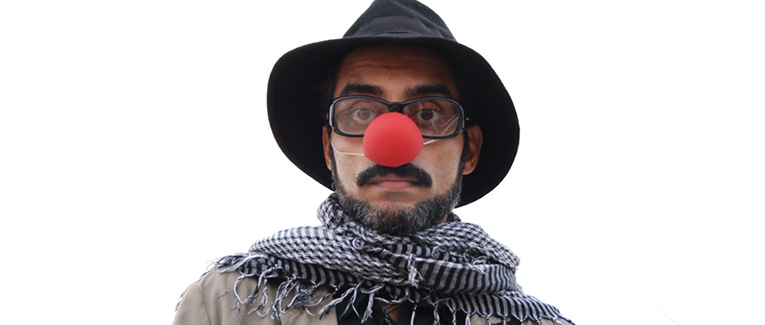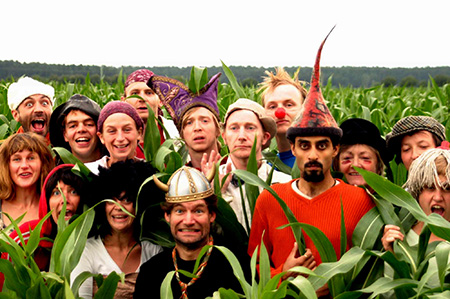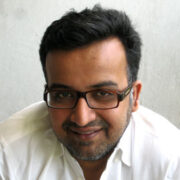Intense, passionate, and expressive, Ashwath Bhatt believes in the power of clowning in theatre, a concept that is new for most people in India. For Ashwath, clowning is about finding the real character in him. His brainchild, the Theatre Garage Project, is a 15-day workshop which explores various aspects of clowning and theatre. The garage happens amidst the serenity of nature, greenery, and peace in northern India. It rejuvenates, unravels, and refreshes.
We caught up with Ashwath for a chat about the Theatre Garage Project and his vision to make it into a residency. Read on for excerpts—

Ashwath Bhatt: No clowning around.
How did you come to be associated with clowning? What is so special about this performance form?
It’s simple. Clowning came my way when I was in England at L.A.M.D.A. (London Academy of Music and Dramatic Arts). I sort of knew a clown (or as some people call it here, a joker) existed but what i saw was completely new. Later on, with the passage of time, I realised that clowning was totally a different form and it really interested me. And the reason why I still love doing it is because it is liberating. It makes me and people around me happy and I would like to add that it is essentially good for professional actors. It makes an actor shed inhibitions and opens them up. I feel that this form is a joy and I don’t want to give up joy.
What is so special and distinct about the Alexander Technique that you practise and teach?
It’s a wonderful technique and I came across this in England. It is a body awareness technique. It’s not very popular in India but it’s a very beneficial technique for actors. This method helps you control your anxieties before you get on stage. It basically just eases and relaxes all tension from the body. It helps in correction of posture, walk and tension release. It works for me and works for other people as well whom I have worked with. I also think that somewhere this helps you to focus better and your mind is calm. Especially in physical theatre, this technique helps one cut down on the physical injuries that happen. It also helps in recovery of injuries. People who have adopted this technique come and tell me we did what we thought we could never do. It helps in better voice production and quality. It helps one understand what is actually wrong. It is for all performing artistes and it helps. I combine this technique with yoga and it really works.
What fascinates you most about theatre?
The name itself, being up on stage, and it’s like a high. Acting is a joy. Theatre for me is a wholesome organic process. There is a theme, you work and rehearse and put up a show. The beauty is that it’s live, it’s now and here. It is not like doing a film, you don’t have to wait. Theatre gives you the freedom to rework on aspects that can be bettered. Theatre is evolving every moment and is closer to life. Theatre has an impact and a recall value.

Ashwath with the Flying Fish Theatre Company.
What is the Theatre Garage Project?
It all started in 2007. I was working for two years with the Flying Fish Theatre Company in Berlin. We went all around Europe, travelled and lived in a bus for eight months in south Asia. It was a great experience. So I thought to myself, why not find a place in India itself where people can come to learn and work away from their urban lives. It took a while for me to find a place in Sonapani, in Ramgad, Nainital. It’s been five years since I have been running this project. When I started off with it, people actually told me things like ‘Who will go to the jungles with you? These are crazy ideas that you have’, and so on. Now that it is working and people are talking about it, the same people want to come and experience it. I want this project to evolve into a residency soon. We are looking for funds and people who can share their expertise with us. Anyone who is willing to share ideas is most welcome to contribute. The aim is to form a community where people work harmoniously together and grow for the betterment of the art.
How essential is it for an artiste to collaborate with artistes practising other forms?
Well, that’s become a style statement now. Theatre, we say, is the amalgamation of all art forms. I am not against it, but all I am trying to say is, have a meaning to it. One should not create gimmicks. The creations should be new, genuine, meaningful and something that the artiste believes in. For me, it can be any kind of collaboration, but in the end it should communicate.
What does one take back home from the Theatre Garage Project?
I think what people take back is that they are more connected to themselves. When I meet my students from the workshop, they actually talk about how they miss the Garage. They tell me that they realise now the applicability of the exercises they learn at the workshop. They also take back some amount of freedom with them. This project is like a refresh button and it awakens the child within every person. I also love the fact that whoever has attended this project so far feels that it’s something one should do at least once in a lifetime. The biggest thing is that it makes people happy.
How is clowning in theatre different from the one in circuses?
The form I do is called the Red Nose clowning. It is different from a clown from the circus who does acrobatics. In the theatre, it is about character clowning. I always tell my students that clowning is with the audience, for the audience. It keeps you on the edge all the time.
Understanding that you hail from Kashmir, has theatre been a platform where you express your angst, anger, and other emotions?
Yes, my early days have been dark, I won’t deny that. Many people tell me that my fixation with home is too much. It is true and only a person who has lost the roof will know what I am saying. Especially when you have to let go your roots because of force, it is traumatic, painful, and unhappy. Theatre was a big outlet for me. It was a big relief that theatre happened to me. It used to give me so much joy even when I would be angry and fed up. I would just forget and immerse myself into it. If not for theatre, I would have been a very angry and volatile person. Theatre became a creative outlet to my anger through plays and its characters. It also gave me the perspective to see a certain situation in different ways. So you begin to analyse and live and see things in a similar manner in real life. Ultimately, art is something that affects and transforms life.

Behind the mask.
How does it feel to wear the tiny red nose?
It makes me feel so powerful. It feels as if I can fight Khali, Manmohan Singh, Obama, scud missiles, and God. That’s how it makes anyone feel. When you wear the nose, you are vulnerable. You are naked because it’s the world’s smallest mask. This mask will only work when you shed all the other masks of your existence or being. If you try to cheat, it flops; it will never work.
How did you arrive at the name ‘Mickey Contractor’ for your clown?
It was eight years back that I found him and I am now looking for new shades of him. I love Mickey Mouse, so the name Mickey came from there. The second half of the name comes from Mickey’s imaginary grandfather, who happens to be a contractor. So Mickey loves to follow his grandfather, and hence the name ‘Mickey Contractor’. Mickey is a character who is naughty, moody, and in your face at times. He always lands up in embarrassing situations, he is misunderstood, and somewhere he resembles me. Mickey is a reflection of me. This year, I want to find newer things about Mickey.
You have studied theatre in two different cultures. What differences in styles, etc. did you perceive?
This is a difficult question to answer right now. But it would be unfair on my part to say that training abroad is structured and in India it is haphazard. I realise that if my understanding and grasping was good during my course in London, it was only due to those three grueling years I spent at the National School of Drama (N.S.D.), Delhi. It’s like N.S.D. gave me questions and L.A.M.D.A. gave me answers.
“The clown is the poetic transposition of the unique silliness of the actor.” How much do you believe in this statement?
I often say acting is Nike and when people say ‘What?’, I say, ‘Just do it’. It’s a craft which should be practised and not talked about. It’s like digging beyond your ego and finding that silly real side that lies deep down. One should be childlike and not childish. That’s what the statement means to me. Silliness for me is losing oneself and shedding that extra baggage we collect while working as actors. A clown is a poet in action.
One attribute of the clown that you love the most?
I love the fact that it is liberation from social crap and makes my existence happy.
Lastly, what is your vision for your work?
Some say theatre will die and some say it will never die. What I think is if it had to die, it would have done so long ago. As long as two things are alive—actors and audience, the two As—and [there is] a space to perform, theatre shall never die. My vision for my work is that I am looking forward to this residency coming true. It won’t be a residency owned by me but a residency that’s open to all artists. Especially for those who want to get away from their environment and require a space that influences them to create inspirational work. The ultimate vision is to have an ‘artistic heaven’. A heaven devoid of unnecessary rules and regulations that suffocate an artist.









Good Piece of Work by Sindhuja Murthy .
Good Interaction.